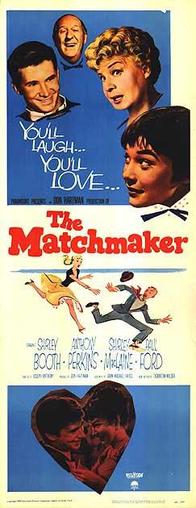Plot
Set in 1884, the story focuses on Dolly Gallagher Levi, a widow who supports herself by a variety of means, with matchmaking as her primary source of income. Horace Vandergelder, a wealthy but miserly merchant from Yonkers, New York, has hired her to find him a wife, but unbeknownst to him, Dolly is determined to fill the position herself. When he expresses his intent to travel to New York City to woo milliner Irene Molloy, Dolly shows him the photograph of a woman she calls Miss Ernestina Simple and tells him the buxom beauty would be a far better choice for him. Horace agrees to have dinner with Ernestina at the Harmonia Gardens after visiting Irene.
Meanwhile, Horace's head clerk, Cornelius Hackl convinces his sidekick Barnaby Tucker that they too, deserve an outing to New York. The two cause cans of tomatoes to explode, spewing their contents about the store, which justifies their closing it for the day and heading to the city. [2] While there, they come across Irene's hat shop, and Cornelius is instantly taken with her. The pair are forced to hide when Mr. Vandergelder and Dolly arrive. Though Dolly and Irene cover up for them, Mr. Vandergelder still realizes that Irene is hiding people in her shop (though he doesn't know who) and leaves in disgust. Irene furiously demands that Cornelius and Barnaby repay her by taking her and the shop assistant, Minnie out to a fancy restaurant for dinner (Dolly had led her to believe that the men were secretly members of high society).
By total coincidence, Cornelius, Barnaby, Irene, Minnie, Horace, and Dolly all dine at the same restaurant. Horace realizes that Dolly tricked him and that there is no such person as Ernestina Simple. Cornelius worries over how to pay for the meal until a well-meaning diner gives him Mr. Vandergelder's wallet (which the diner believes Cornelius dropped). Over the course of the evening, Irene and Cornelius fall in love as Barnaby falls for Minnie. The two men escape being caught by Mr. Vandergelder by disguising themselves as women and dancing towards the door. Before going, they leave the two women a note confessing who they really are and that they love them.
The next day, Dolly and Cornelius pretend to be setting up a store of their own across the street from Mr. Vandergelders. Frightened by the competition, Horace gives the shopkeepers better working hours and wages. Realizing how foolishly he's been acting, he agrees to marry Dolly as well.
This page is based on this
Wikipedia article Text is available under the
CC BY-SA 4.0 license; additional terms may apply.
Images, videos and audio are available under their respective licenses.

